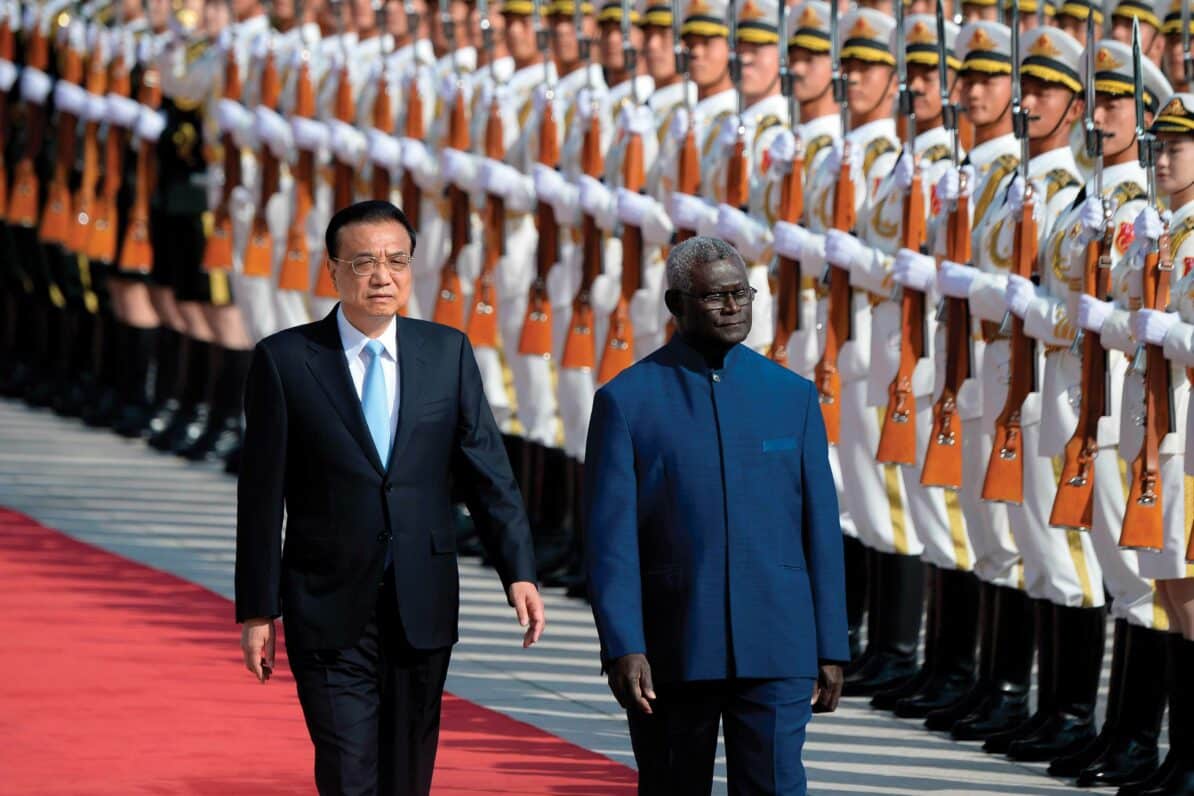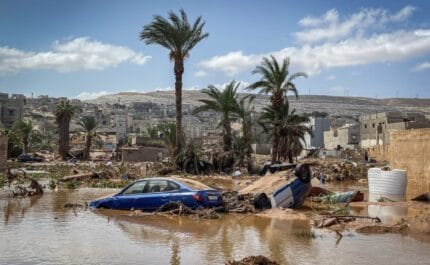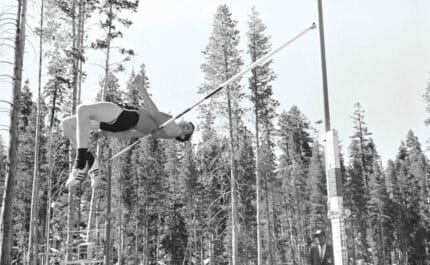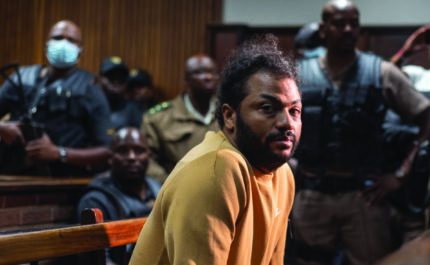Moment that mattered: The Solomon Islands signs a security pact with China
In issue 47 we spoke to Peter Kenilorea Jr, a Solomon Islands opposition MP, about China's increasing influence over his country

Solomon Islands prime minister Manasseh Sogavare (right) and Chinese premier Li Keqiang inspect honour guards during a welcome ceremony at the Great Hall of the People in Beijing, 2019. Photo: Wang Zhao/AFP via Getty Images
19th April 2022 (Taken from: #47)
On 19th April, China confirmed that it had signed a wide-ranging security agreement with the Solomon Islands. The pact didn’t come as a surprise – a draft copy had leaked the previous month, sending shock waves through the Pacific region. The leak, which Solomon Islands prime minister Manasseh Sogavare blamed on “lunatics and agents of foreign regimes”, revealed that under the terms of the agreement the Pacific island nation of 700,000 people will have the option of calling in Chinese naval or security forces for a variety of purposes, and would also permit Chinese navy ships to “replenish” in the country.
Peter Kenilorea Jr, a member of the Solomon Islands’ opposition United Party and the chair of its parliamentary foreign relations committee, says he worries about the access China will now have to his country. “What I saw in the draft was very, very concerning,” he says, noting that the negotiations between Beijing and the government in Honiara took place in secret. “The pact outlines that China can come in with their naval vessels to be replenished here – but ‘replenished’ is open to interpretation. When they talk about ‘replenishment’ it sounds like they’re looking at refuelling, which implies infrastructure that we don’t have. We don’t have the infrastructure for naval vessels, only ones servicing cargo vehicles.”
Kenilorea Jr’s fear that the pact will open the door to the construction of a Chinese naval base in the Solomon Islands is shared by its traditional allies in the West. In Australia, which says it would not tolerate a Chinese military presence 1,200 miles off its northeast coast, the leak of the draft pact became an issue of contention in the country’s federal elections. During campaigning the Labor party, which won the 21st May poll, accused then-prime minister Scott Morrison of being responsible for “the worst Australian foreign policy blunder in the Pacific” in decades for failing to prevent China from further cementing its influence in the region.
Sogavare continues to insist that Canberra remains Honiara’s “security partner of choice” and has repeatedly denied that China will build a base in the country. Kenilorea Jr, however, doesn’t believe Sogavare’s denials. “I told the prime minister after one of our debates, ‘Don’t let China make a liar out of you.’” Before he became an MP, Kenilorea Jr spent 18 years working at the United Nations in New York, where, he says, he “observed how much more aggressive China was getting, with an expansionist outlook… and a strategy in place of pulling away Taiwanese allies.”
Taiwan lost the Solomon Islands as an ally in September 2019, when Sogavare switched the island’s diplomatic ties to Beijing. Referred to in the Solomon Islands simply as “the switch”, the geopolitical tug-of-war that saw ties cut with Taiwan amounted to the betrayal of an old friend, says Kenilorea Jr. “Our founding fathers made a decision 40 years ago to choose Taiwan over China,” says the MP, whose own father, Peter Kenilorea, was the first prime minister of an independent Solomon Islands. “The big thing for me, which I hold dear, is that we are both small island states – and there’s a certain sense of affinity we had with them.”
China, on the other hand, is the most populous country in the world. It has more than 140 cities with populations bigger than the entire Solomon Islands. “The imbalance in the [China-Solomons] relationship is something I’ve been very concerned about since the get-go,” says Kenilorea Jr, who thinks it’s unrealistic to believe that the Solomon Islands holds even a modicum of influence with China. “We still haven’t seen the final signed agreement yet so we’re still going by what’s in the draft… and the language that’s used is very open to interpretation. The language [often refers to] ‘both parties’ deciding on this or that but this comes back to the imbalance in the relationship – there’s really only one party [in control] here.”
I see every day that our elites are captured. Elite capture is a strategy that China does around the world”
Kenilorea Jr says his “biggest gripe” over the security pact is that it offers “no benefit at all” for the people of the Solomon Islands. There’s no evidence, he claims, that the various Chinese infrastructure projects in the country, including a multi-million-dollar new national stadium for the 2023 Pacific Games (a “gift” from Beijing which was going to be funded by Taiwan until ‘the switch’) are having a positive impact on the economy or even providing many jobs for locals. One recent development of increased cooperation since ‘the switch’, the construction of 161 mobile communication towers by Huawei, the Chinese telecoms giant banned from several Western countries’ 5G networks due to alleged security risks, has proven particularly contentious. Kenilorea Jr says the masts aren’t needed because the existing infrastructure is sufficient and some in his constituency of East Are’Are are being put up “in the middle of nowhere”. He believes that the country may struggle to repay the $66 million loan secured from China to pay for the Huawei towers.
In November 2021 there were riots in Honiara’s Chinatown. Four people died, protesters attempted to storm parliament and many buildings – several Chinese-owned – were burned to the ground. Kenilorea Jr says that public discontent over ‘the switch’ wasn’t the only reason for the violence – a simmering cauldron of poverty, unemployment, anger over corruption and longstanding regional tensions all played a role. Due to their bilateral security treaty, Australia sent peacekeeping forces to Honiara to help quell the violence. “There were criticisms that Australia acted too slowly,” says Kenilorea Jr, who believes that should something similar happen again, due to the terms of the security pact Chinese armed police or troops might be deployed to tackle rioters in the Solomon Islands. “You can see that Sogavare is angling towards closer ties to Beijing to provide boots on the ground in the future.” The government has said that Kenilorea Jr’s concerns over China training police in the Solomon Islands amounted to “fearmongering”.
Leaked documents unveiled by Australian journalists in December 2021 revealed another benefit of closer Chinese relations for the prime minister. Last year many Solomon Islands MPs received a payment of around £25,000, paid directly into their bank accounts from a slush fund of Chinese money directly controlled by Sogavare’s office. Shortly after the payments were made, Sogavare survived a vote of no-confidence in parliament. Were these bribes to help him stay in power? “The answer to that is very clear,” says Kenilorea Jr, who says that as an opposition MP he hasn’t been offered the Chinese funds. “That money was used to buy votes… and a [former] member of the government who defected to my party confirmed it to me.” Sogavare acknowledges that the fund isn’t new and that Taiwan used to pay into it before ‘the switch’, but says that “most of it in the past was for infrastructure and transportation, not just divvied up and sent to bank accounts.”
While the new agreement has significant political, economic and security implications for his country, Kenilorea Jr also worries about what it symbolises. Is the move away from Taiwan and towards authoritarian China a sign of democracy backsliding? “That’s fundamentally my biggest concern,” he replies. There are growing anxieties over freedom of speech and media freedom in the Solomon Islands. In August Sogavare, seemingly furious at Australia’s national broadcaster ABC over a film called Pacific Capture: How Chinese Money is Buying the Solomons, threatened to ban ‘disrespectful’ foreign journalists from entering the country. Kenilorea Jr says that journalists at the Solomon Islands Broadcasting Corporation are now self-censoring in fear of government reprisals.
More alarmingly, on Friday 9th September parliament passed a bill submitted by Sogavare to delay a summer 2023 election until 2024. “This is definitely a power-grab [by Sogavare],” Kenilorea Jr says. “The government’s argument is that we can’t afford to hold two big events in one year – the Pacific Games and the elections.” He doesn’t think this is true, and says that this argument was undermined when Australia offered to fund the scheduled elections next year. Sogavare responded angrily to Canberra’s offer, accusing Australia of “foreign interference”.
Kenilorea Jr says that he feels uneasy watching MPs and government ministers enter parliament wearing lapel pins of the Chinese flag. “I can see every day that our elites are captured,” he says. “Elite capture is a strategy that China does around the world and we’re caught up in it.”
Does Kenilorea Jr hope to follow in his father’s footsteps and lead the Solomon Islands one day? “If the calling came I would not shy away from it,” he says. “I hear it every day. When I’m out shopping people will come and tell me they want me to be prime minister… It’s an honour.”
And would the security agreement with China survive a Kenilorea Jr administration? “It would go on day one,” he replies. “We don’t need it. We already have a security agreement with Australia. If I become prime minister it will be the first thing to go.”
Slow Journalism in your inbox, plus infographics, offers and more: sign up for the free DG newsletter. Sign me up
Thanks for signing up.








